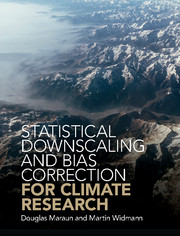Book contents
- Frontmatter
- Dedication
- Contents
- Preface
- Acknowledgements
- 1 Introduction
- Part I Background and Fundamentals
- 2 Regional Climate
- 3 History of Downscaling
- 4 Rationale of Downscaling
- 5 User Needs
- 6 Mathematical and Statistical Methods
- 7 Reference Observations
- 8 Climate Modelling
- 9 Uncertainties
- Part II Statistical Downscaling Concepts and Methods
- Part III Downscaling in Practice and Outlook
- Appendix A Methods Used in This Book
- Appendix B Useful Resources
- References
- Index
9 - Uncertainties
from Part I - Background and Fundamentals
Published online by Cambridge University Press: 27 December 2017
- Frontmatter
- Dedication
- Contents
- Preface
- Acknowledgements
- 1 Introduction
- Part I Background and Fundamentals
- 2 Regional Climate
- 3 History of Downscaling
- 4 Rationale of Downscaling
- 5 User Needs
- 6 Mathematical and Statistical Methods
- 7 Reference Observations
- 8 Climate Modelling
- 9 Uncertainties
- Part II Statistical Downscaling Concepts and Methods
- Part III Downscaling in Practice and Outlook
- Appendix A Methods Used in This Book
- Appendix B Useful Resources
- References
- Index
Summary
Simulations of future climate are affected by inherent uncertainties – an iconic illustration of at least part of these uncertainties is the ensemble projections of global mean temperature (Collins et al. 2013, see Figure 9.1). Understanding, quantifying and attributing these uncertainties is of genuine scientific interest as they reflect both our limited understanding of the system and fundamental limits of predictability. But it is furthermore indispensable if credible and salient climate information is required for decision making (see Chapter 5). In this chapter we will discuss different types of uncertainties in climate projections (Section 9.1) and how they can be assessed by ensembles of climate models (Section 9.1). The actual interpretation of uncertainties will be discussed in Chapter 18.
Types of Uncertainties in Climate Projections
Uncertainties are often categorised into epistemic and aleatory (O'Hagan 2004). Epistemic uncertainty refers to our limited knowledge – it is thus in principle reducible. Aleatory uncertainty stems from unknowable knowledge and describes the limited ability to predict the behaviour of a system because of randomness intrinsic to the system itself – it is therefore often called ontic or ontologic uncertainty (van Asselt et al. 2002, Foley 2010). As it is a fundamental property of the considered system, aleatory uncertainty is inherently irreducible.
In practice the characterisation of uncertainty as either epistemic or aleatory is not clear cut but often reflects limitations in our current knowledge as well as practical constraints. For instance, the high uncertainty in state-of-the-art climate predictions from seasons to decades ahead may not be fully attributable to intrinsic stochasticity of the climate system but may be partly caused by our insufficient knowledge of initial conditions as well as model biases. Thus, part of the uncertainty characterised as aleatory might turn out to be epistemic and therefore in principle reducible (Hawkins and Sutton 2009).
Before discussing different sources of uncertainty in more detail, it might be helpful to recall how simulations of future climate – at the global and regional scale – are generated. As discussed in Chapter 8, climate models are numerical representations of our theories about atmosphere-ocean dynamics and thermodynamics as well as interactions with other components of the climate system.
- Type
- Chapter
- Information
- Statistical Downscaling and Bias Correction for Climate Research , pp. 123 - 132Publisher: Cambridge University PressPrint publication year: 2018



